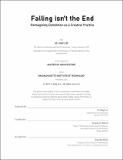Falling isn't the End: Reimagining Demolition as a Creative Practice
Author(s)
Lee, So Jung
DownloadThesis PDF (71.84Mb)
Advisor
Clifford, Brandon
Terms of use
Metadata
Show full item recordAbstract
This thesis investigates resilience not as an endpoint but as a condition of continuous transformation. It critiques the shortcomings of current architectural discourse in addressing climate disasters, waste, and carbon footprints. While these crises are widely acknowledged, architecture often operates within restrictive economic, legal, and cultural systems, relegating resilient design to the periphery or diminishing its potential impact.
Collapse, traditionally perceived as failure, is reimagined here as a generative moment—an opportunity to rethink materials, systems, and the narratives that shape them. Central to this exploration is the concept of assembly, where materials are designed with deliberate life spans—some transient, others enduring. By anticipating the gaps and shifts that arise when permanence is no longer assumed, this thesis proposes new possibilities for adaptive design and architectural resilience within the evolving rhythms of life.
To articulate these ideas, the thesis employs speculative scenarios and temporal media. These tools position architecture as a system in flux, evolving in tandem with societal and environmental changes. Through narrative-driven methodologies, this work seeks to expand architectural discourse, prompting reflection on the discipline’s foundational assumptions while connecting it to broader cultural and systemic challenges.
Ultimately, this thesis redefines resilience—not as resistance or mere survival but as a dynamic and imaginative practice. It advocates for architecture’s leadership within the broader zeitgeist of sustainability, transforming pressing global challenges into opportunities for creative agency and systemic reinvention.
Date issued
2025-02Department
Massachusetts Institute of Technology. Department of ArchitecturePublisher
Massachusetts Institute of Technology